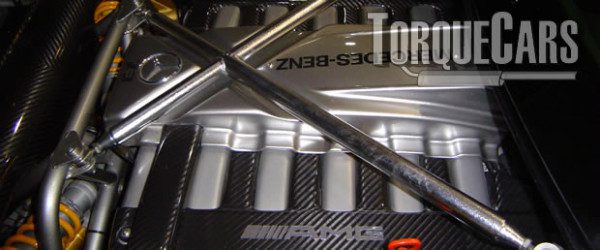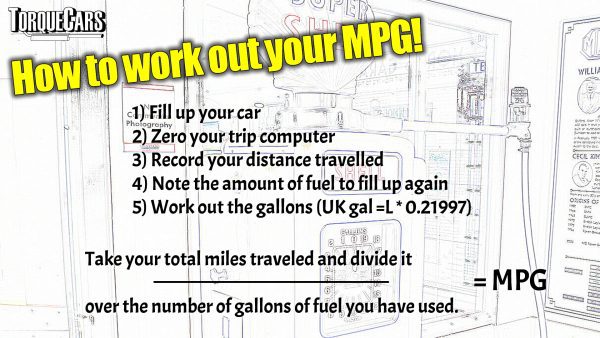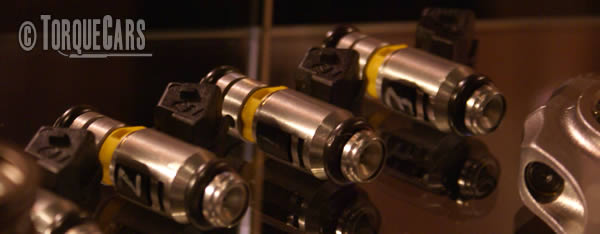Fuel saving tips
Most drivers are wasting fuel by ignoring a few simple steps.
If you were a Hypermiler you'd be going to extreme measures to eek out as much distance from each drop of fuel so we'll cover some of the more extreme fuel saving options out there.
See our YouTube Hypermiling Video link based on this article.
Use our Free MPG calculator to track your progress.
Engine condition
Keeping the engine properly serviced and clean will make a big difference to fuel economy.
If fuel economy figures are way down on the manufacturers claim then you should really look first of all at the condition of the engine.

Does oil selection affect fuel consumption?
Yes, it does. Minimizing the internal friction and reducing engine wear are two factors that a good quality oil will address.
TorqueCars recommend a high quality FULLY synthetic oil for most applications. Mineral oils tend to break down over the oil change interval.
Synthetics are engineered to lubricate, clean and cool an engine and you should always use the specification of oil recommended by your manufacturer.
See our YouTube Video about our MPG calculator.

Do fuel additives help with saving fuel?
Running a good quality fuel cleaner through the engine will help to keep the injectors and valves in good condition.
But there are many claims made for fuel additives out there that are optimistic at best.
The only fuel cleaner that TorqueCars recommends at the moment are those made by BG - namely BG244 and BG44K.
We have used both of these products and noticed an increase in power and engine efficiency.

What effect do tires, and tire pressures have on fuel consumption?
Tire pressures will drop all of the time, so when the car is cold check the pressures and raise them to the manufacturers upper spec (considering the usual load).
This should gain you around 4 mpg at mid speeds and will allow you to determine if you have a puncture when you frequently check them.
Tire type and size also impact on fuel. Grip causes friction and by minimizing grip through a smaller contact patch you also reduce friction. Energy efficient tires will generally give another 4-7mpg through clever tread design and tire compound and composition.
Carrying junk around will add to the work the engine has to do to overcome inertia. Clear out all unnecessary tools and items from the car.
Hypermilers will replace car panels with carbon fibre ones, fit lighter weight components and change the wheels for lighter thinner ones.
Hotter engines are more efficient so avoid short journeys on cold engines. Changing out the thermostat and blanking off part of the radiator are methods extreme hypermilers may employ.
See our YouTube Video with more fuel saving tips.
How does your driving style affect fuel consumption?
The faster you go the more fuel you will use.
Driving at 50-60 on motorways will dramatically decrease the fuel you use on a typical journey. Conversely driving at 70-80 will use much more fuel than you would at say 65.
Thinking ahead and avoiding braking and following another cars slipstream will also cut down the fuel you use.
TorqueCars does not encourage dangerous tailgating though, you should always follow at a safe 2 second distance and leave sufficient braking time.
Planning your journey to stick to main roads and avoiding junctions will prevent delays and wasted fuel.

Turn off your engine when your car is idling in traffic if it is safe and legal to do so in your area. Modern cars fitted with stop start technology do this automatically.
Buying a more economical car is not usually a saving when you factor in the additional cost of the car and depreciation.
For most drivers it makes more economic sense to keep an older car running for 10 years than to change car every few years.
Higher octane/cetane fuels will generally give better fuel economy if your engine is designed to benefit from them.
On cars we've owned we see around 50 miles extra on a tank of premium fuel compared to the standard fuel. As it is more expensive the saving benefits are debatable.
Please Check out my YouTube channel, we're regularly adding new content...
PLEASE HELP: I NEED YOUR DONATIONS TO COVER THE COSTS OF RUNNING THIS SITE AND KEEP IT RUNNING. I do not charge you to access this website and it saves most TorqueCars readers $100's each year - but we are NON PROFIT and not even covering our costs. To keep us running PLEASE Donate here
If you liked this page please share it with your friends, drop a link to it in your favourite forum or use the bookmarking options to save it to your social media profile.
Feedback - What do You Think?
Please use our forums if you wish to ask a tuning question, and please note we do not sell parts or services, we are just an online magazine.
Help us improve, leave a suggestion or tip
Please watch this video and subscribe to my YouTube channel.
2 Responses to “How to save over 20% fuel”

 Click to accept YouTube Cookies & Play.
Click to accept YouTube Cookies & Play.
Interesting info. Three points: Carbon fiber panels won’t greatly affect the weight of vehicles with large engines or steel chassies. This is most effective on smaller, lighter cars in terms of affecting a % of the car’s original mass. And cars that have aluminum body panels will see more benefit vs. fiberglass.
There are two other driving tips that I have found useful. It takes a lot more fuel to accelerate over a given distance than cruise. Instead of seeking main vs. side roads or vice versa, seek traffic that moves evenly – a 35 kph crawl is likely to be more economical than zipping from one intersection to another. And when you do come to a halt, instead of turning the engine off, simply hold down the brake and shift into neutral (on level ground! DO NOT try this on hills or steep grades!). In automatic transmissions this uncouples the torque converter and reduces the load on the engine without the added wear of stopping and starting on your engine and starter motor.
Hope that helps.
Anticipating a red light helps as well a putting your trans in neutral down hill one friend refuses to park where he has to back up?